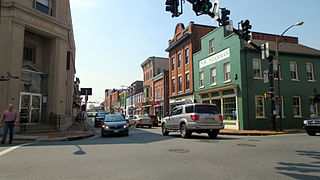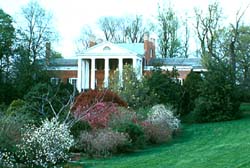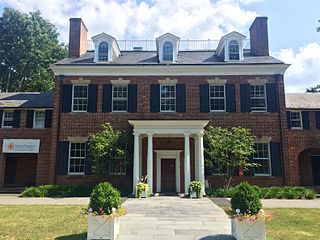
Hamilton is a town in the Loudoun Valley of Loudoun County, Virginia, United States. The population was 506 as of the 2010 census.

Leesburg is a town in and the county seat of Loudoun County, Virginia, United States. It is part of both the Northern Virginia region of the state and the Washington metropolitan area, including Washington, D.C., the nation's capital.
Colonel Stevens Thomson Mason was an American lawyer, military officer and planter who served in the Continental Army during the Revolutionary War. Mason was also a delegate in the Virginia General Assembly and a Republican U.S. Senator from 1794 to 1803.

Oak Hill is a mansion and plantation located in Aldie, Virginia that was for 22 years a home of Founding Father James Monroe, the fifth U.S. President. It is located approximately 9 miles (14 km) south of Leesburg on U.S. Route 15, in an unincorporated area of Loudoun County, Virginia. Its entrance is 10,300 feet (3,100 m) north of Gilberts Corner, the intersection of 15 with U.S. Route 50. It is a National Historic Landmark, but privately owned and not open to the public.

The Washington and Old Dominion Railroad Regional Park is a linear regional park in Northern Virginia. The park's primary feature is the Washington and Old Dominion Railroad Trail, an asphalt-surfaced paved rail trail that runs through densely populated urban and suburban communities as well as through rural areas. Most of the trail travels on top of the rail bed of the former Washington and Old Dominion Railroad, which closed in 1968.
NOVA Parks is an inter-jurisdictional organization that owns and operates more than 10,000 acres of woodlands, streams, parks, trails, nature reserves, countryside and historic sites in Northern Virginia in the United States. The Authority was organized in 1959. NOVA Parks presently operates 34 regional parks.
Loudoun County, Virginia, was destined to be an area of significant military activity during the American Civil War. Located on Virginia's northern frontier, the Potomac River, Loudoun County became a borderland after Virginia's secession from the Union in early 1861. Loudoun County's numerous Potomac bridges, ferries and fords made it an ideal location for the Union and Confederate armies to cross into and out of Virginia. Likewise, the county's several gaps in the Blue Ridge Mountains that connected the Piedmont to the Shenandoah Valley and Winchester were of considerable strategic importance. The opposing armies would traverse the county several times throughout the war leading to several small battles, most notably the Battle of Ball's Bluff.
Thomson Mason was an American lawyer, planter and jurist. A younger brother of George Mason IV, United States patriot, statesman, and delegate from Virginia to the U.S. Constitutional Convention, Thomson Mason would father Stevens Thomson Mason, and was the great-grandfather of Stevens T. Mason, first Governor of Michigan.

Raspberry Plain is a historic property in Loudoun County, Virginia, near Leesburg. Raspberry Plain became one of the principal Mason family estates of Northern Virginia, and was rebuilt in the early 20th century. It currently operates as an event site, hosting weddings and other special events year round.
William Temple Thomson Mason was a Virginia farmer and businessman.
Chopawamsic was an 18th-century plantation on Chopawamsic Creek in Stafford County, Virginia. Chopawamsic was a seat of the Mason family, which enslaved people there.
Thomson Francis Mason was an American lawyer, planter and politician who served as the mayor of Alexandria between 1827 and 1830, and as a justice of the peace for many years and briefly in the months before his death as a judge of the Washington, D.C., criminal court.

Huntley, also known as Historic Huntley or Huntley Hall is an early 19th-century Federal-style villa and farm in the Hybla Valley area of Fairfax County, Virginia. The house sits on a hill overlooking Huntley Meadows Park to the south. The estate is best known as the country residence of Thomson Francis Mason, grandson of George Mason of nearby Gunston Hall. It is listed on the National Register of Historic Places (NRHP), the Virginia Landmarks Register (VLR), and the Fairfax County Inventory of Historic Sites.

Colross is a Georgian style mansion built around 1800 as the center of a large plantation in what is now the Old Town neighborhood of Alexandria, Virginia, and moved circa 1930 to Princeton, New Jersey, where it is currently the administration building of Princeton Day School.
Okeley Manor was an early 19th-century plantation in Fairfax County, Virginia, United States. Okeley, the residence of prominent Alexandria physician Richard Chichester Mason (1793–1869), was one of the principal Mason family estates in Northern Virginia. Mason's plantation house was used as a hospital during the American Civil War and burned to prevent the spread of smallpox.
Locust Hill is an early 19th-century Federal-style mansion north of Leesburg in Loudoun County, Virginia, United States. Locust Hill was the home of John Thomson Mason, a prominent American jurist and Attorney General of Maryland in 1806 and nephew of Founding Father of the United States George Mason.
Chestnut Hill is an 18th-century Federal-style mansion north of Leesburg in Loudoun County, Virginia, United States. Chestnut Hill was a home of Thomson Francis Mason, a prominent jurist, lawyer, councilman, judge, mayor of Alexandria, and grandson of Founding Father of the United States George Mason. Chestnut Hill was also a home of Mason's son, Dr. John "Frank" Francis Mason. It is located at 13263 Chestnut Hill Lane near Leesburg.
Arthur "Pen" Pendleton Mason was an American military officer, merchant, planter and lawyer who served as a lieutenant colonel in the Confederate States Army serving during the American Civil War. Mason was a scion of the prominent Mason political family of Virginia.
Selma is a historic property and former plantation in Loudoun County, Virginia, near Leesburg. Selma is best known as the residence of Armistead Thomson Mason, a U.S. Senator from Virginia from 1816 through 1817.

Carlheim is a mansion located in the northeast part of Leesburg, Virginia. It was constructed in about 1872 for Pennsylvania industrialist Charles R. Paxton (1816–1889) and his wife Rachel who continued to live there until her death in December 1921. When constructed, it sat on over 760 acres (3.1 km2) roughly bounded on the north end by the Red Rock Wilderness Overlook Regional Park, the Ball's Bluff Battlefield and the Potomac River. In accordance with Mrs. Paxton's will, the buildings and 50 surrounding acres were preserved and organized into a charitable trust to benefit "needy children."











